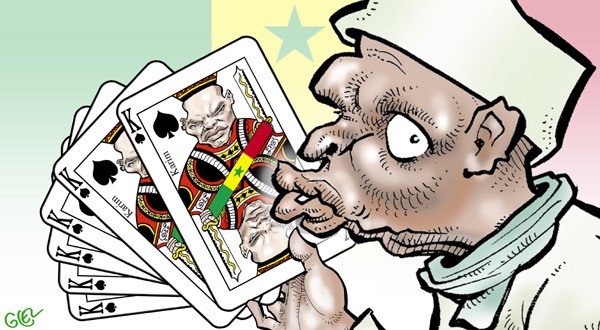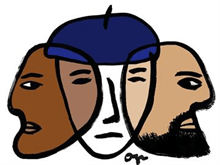
The Senegalese people are extremely disillusioned. In 2000, they enthusiastically went to the polls to elect Abdoulaye Wade as their president. Wade had campaigned as an agent of change, but change never came to Senegal throughout his decade in power. Now the only change he wants to make is to the constitution, so that he can retain his hold on power.
Wade turned out to be almost a caricature of the dozy African potentate for whom power, nepotism, and embezzlement become indistinguishable. So deeply has he identified his and his family’s interests with the state that he appointed his son, Karim Wade, to head four different ministries – international cooperation, air travel, infrastructure, and energy – simultaneously.
To make young Wade his successor, the 86-year-old president has resorted to every trick in the book. He staged a photo opportunity for his designated-heir with Barack Obama during the G-8 meeting in Deauville in 2011, and followed that up with a trip to Benghazi – his flight escorted by French Mirage fighters – to lambast Colonel Muammar el-Qaddafi. In doing so, Wade broke ranks with the rest of the African Union, naively expecting to gain French and Western support for his bid to retain power.
Soon after, he launched his campaign for constitutional change, which Senegalese view as an attempt to enshrine in law his son’s rise to power. Thousands marched in protest to the National Assembly in June 2011, and the amendment has since been withdrawn. But, he stubbornly maintains his candidacy for a third term in office, in blatant breach of the constitution which limits the number of terms to a maximum of two. He appointed a Constitutional Court composed of five judges, lavishing limousines and cash bonuses on them, in an attempt to ‘persuade’ them to support his bid.
Protesters led by the ‘Y’en A Marre’ (Fed up) group and the M23, a popular citizen movement composed of opposition parties, civil society groups and ordinary citizens, took again to the streets to denounce peacefully what they saw as a constitutional coup d’état. Senegalese police fired on them with live ammunition killing a student demonstrator and wounding at least ten others. The riots spread to other parts of the country. In the Northern town of Podor, a violent protest left two dead – a young high school student and a 60-year old grandmother.
Wade’s shortcomings have also hurt Senegal’s economy. The 1.16 per cent annual growth of the agricultural (which employs sixty per cent of the country’s people) was quite insufficient to provide for a population growing 2.5 per cent annually.
The country succeeded in irrigating only 15 per cent of the planned 250 000 hectares. It imports three quarters of the rice it consumes. Fishery resources are being over-exploited under agreements signed with the European Union. Husbandry suffers the same lack of rigorous management and the country spends a fortune buying the meat and milk that it could easily produce for itself if farmers had proper incentives.
These are just a few examples of the vast misuse of the country’s resources – the causes have always been twofold. Firstly, there always has always been a marked preference by the Senegalese elites to use import licences to build their own fortune rather than develop import substitution industries. Secondly, there is the drag on the economy represented by France’s unchallenged economic domination of the Franc Zone (whose member countries are the former French African colonies including Senegal). Through its adopted monetary policy, the Franc Zone economies are in fact mere offshoots of the French economy. The CFA franc is convertible in Euros and freely transferable to France whose companies control the lion’s share of the private sector, and are the beneficiaries of most of awarded public contracts. This entails a mass capital flight.
The CFA franc’s fixed exchange rate is pegged to the Euro and is overvalued, this shields French companies from any risk of capital loss at a time when countries around the world are battling to maintain competitive exchange rates in order to export their way out of economic trouble. With such a currency regime in place, there is no prospect for proper industrialisation in the Franc Zone countries. Astonishingly, these still have to surrender 50 per cent of their exchange reserves to the French Treasury as a guarantee of the CFA franc’s limited convertibility and free transfer to France. In short, they are in effect paying for the favours they are doing for the French economy.
To curb the public deficits that such monetary and economic policies entail, the Franc Zone countries underwent drastic structural adjustment programmes throughout the eighties and nineties under the auspices of the IMF and the World Bank. The CFA franc was massively devalued in 1994.
When he was the leader of the opposition, Wade was critical to the CFA franc. He was quoted declaring that the CFA franc created in Dakar in the morning would end up in Paris in the afternoon. Once he was elected President, he changed his tune. He now dubs the CFA franc the best currency in the world.
No matter how abnormal the Franc Zone mechanism is, all those francophone African leaders such as Sylvanus Olympio of Togo, Hamani Diori of Niger, Thomas Sankara of Burkina Faso or Laurent Gbagbo of Cote d’Ivoire who dared to challenge it were humiliated, evinced or worse eliminated by France with the complicity of their African Presidential peers. Yet, the dismemberment or the reforming of the Franc Zone is long overdue. In the case of dismemberment, the Franc Zone countries would free themselves from the yoke of France and issue their own individual currencies. The hurdles strewn along the path of such a radical approach are twofold. One is related to France’s capacity to block any move that it deems a threat to its interest, thanks to the right of veto that it enjoys in the running of the Franc Zone’s two Central Banks and the overbearing political clout that it exercises over its former African colonies. The other is related to the lack of interest on the part of the small and non-oil producing Franc Zone countries which prefer the pooling, rather than the splitting, of reserves that would leave them even more vulnerable to external shocks.
On the other hand, reforming the Franc Zone would entail pegging the CFA franc not only to the Euro but to a collection of other currencies, abrogating its fixed exchange rate and its convertibility, and fast-tracking economic integration. The trouble remains that a common currency requires unified and centrally agreed monetary and fiscal policies. This necessitates political integration, which, as the troubles of the Euro have demonstrated lately, is a hard sell among nation-states.
The economic woes of Senegal and other Franc Zone countries stand in sharp contrast to other reviving African economies. Since 2000, sub-Saharan African countries have achieved average economic growth of 5-7 per cent compared to 2.5-3 per cent in the Franc Zone. In 2008, Africa’s combined economic output reached $1.6 trillion and consumer spending $860 billion. During the 2009 global recession, Africa and Asia were the only two regions in the world where GDP rose. From 2011 to 2015, apart from China (9.5%), India (8.2%) and Vietnam (7.2%), seven of the ten countries where growth rates will be the highest globally are predicted to be in sub-Saharan Africa: Ethiopia: 8.1%, Mozambique 7.7%, Tanzania 7.2% Congo 7.0%,Ghana 7.0%, Zambia, 6, 9%, Nigeria 6.8%
In this regard, a comparison of Ghana and Senegal is illuminating. At the time of independence Senegal had better infrastructure and human resources than Ghana. However, five decades of economic mismanagement, first under 40 years of socialist mismanagement, and then by Wade’s liberals for the last decade, have eroded this heritage. Due to its superior infrastructure, Ghana is attracting many billions more of foreign investment, and a much greater volume of trade, than Senegal.
Senegal, by virtue of its strategic position on the westernmost point of West Africa’s coastline (sharing borders with Mauritania, Mali, Guinea and Guinea-Bissau), is in a prime position to serve as an important regional centre for natural resource development. The economic benefits that such a strategy would entail are potentially vast: new industries in mineral processing, transport and shipping with the promise of higher value added employment; income for the national budget from transit fees for transport of minerals for export, and potential for pipeline transit fees as well.
Senegal’s longstanding political stability, successfully alternating political power over half a century, hangs on the balance. Will the time-tested democratic credentials prove their vitality in preventing the kind of electoral turmoil and violence witnessed in other Franc Zone countries such as Cote d’Ivoire, Gabon or Niger? This will depend on President Wade coming to his senses and withdrawing his candidacy, or the angry Senegalese electorate waiting peacefully to vote en masse on February 26 to oust him.
Sanou Mbaye, an economist and a writer is a former senior executive of the African Development Bank. His most recent book is “L’Afrique au secours de l’Afrique” (Africa to the rescue of Africa).


